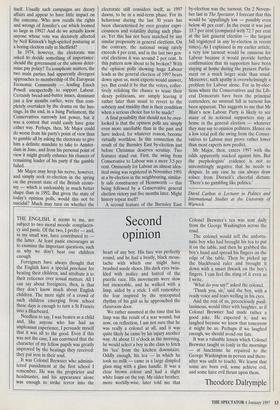Second opinion
THE ENGLISH, it seems to me, are subject to two moral moods: complacen- cy and panic. Of the two, I prefer — and, in my small way, have contributed to the latter. At least panic encourages us to examine the important questions, such as why we don't beat our children enough.
Foreigners have always thought that the English have a special penchant for beating their children, and attribute it to their reticence over sexual matters. All I can say about foreigners, then, is that they don't know much about English children. The mere sight of a crowd of such children emerging from school these days is enough to turn a St Francis into a Bluebeard.
Needless to say, I was beaten as a child and, like anyone who has had an unpleasant experience, I persuade myself that it was all to the good. Even if this was not the case, I am convinced that the character of my fellow pupils was greatly improved by the beatings they received: they put iron in their soul.
It was Colonel Brewster who adminis- tered punishment at the first school I remember. He was the proprietor and headmaster, and his appearance alone was enough to strike terror into the heart of any boy. His face was perfectly round, and he had a bristly, black mous- tache with which one might have brushed suede shoes. His dark eyes twin- kled with malice and hatred of the puerile race. His movements were slow but inexorable, and he walked with a limp, aided by a stick: I still remember the fear inspired by the syncopated rhythm of his gait as he approached the classroom door.
We rather assumed at the time that his limp was the result of a war wound, but now, on reflection, I am not sure that he was really a colonel at all, and it was quite likely he came by his injury another way. At about 11 o'clock in the morning, he would select a boy in the class to fetch his lea' from the kitchen downstairs. Oddly enough, his tea — in which he took no milk — came in a large dimpled glass mug with a glass handle. It was a clear brown colour and had a slight white foam on the top. My older brother, more worldly-wise, later told me that Colonel Brewster's tea was sent daily from the George Washington across the road.
The colonel would tell the unfortu- nate boy who had brought his tea to put it on the table, and then he grabbed the boy's hand and spread his fingers on the edge of the table. Then he picked up the blackboard ruler and brought it down with a smart thwack on the boy's fingers. I can feel the sting of it even as I write.
`What do you say?' asked the colonel.
`Thank you, sir,' said the boy, with a ready voice and tears welling in his eyes.
And the rest of us, precociously pusil- lanimous, would titter with laughter, as if Colonel Brewster had made rather a good joke. He expected it, and we laughed because we knew that tomorrow it might be us. Perhaps if we laughed enough, we should avoid our fate.
It was a valuable lesson which Colonel Brewster taught us (only in the mornings — at lunchtime he repaired to the George Washington in person and there- after was unfit to teach). We learnt that some are born evil, some achieve evil, and some have evil thrust upon them.
Theodore Dalrymple


























































 Previous page
Previous page